Kevin DeYoung's Blog, page 120
December 22, 2012
The Genealogy Never Sounded So Good
Andrew Peterson is a gifted singer-songwriter. And as I said on Monday, his Christmas album, Behold the Lamb of God (Amazon, mp3, The Rabbit Room), is superb.
This song is one that my kids like to recite (or least make an attempt).
And here is a different version, a tad slower (!). This version also gives the explanation for that puzzling line about Jehoiachin being a liar.
December 21, 2012
Upcoming Services at University Reformed Church
For URC members and others thinking of visiting, here is the worship schedule for our church over the next few weeks. Some times are out of the ordinary. The normal schedule resumes January 6.
Sunday, December 23
10:00am – Kevin DeYoung preaching on John 1:18 (one combined morning service)
6:00pm – Ben Falconer preaching on Amos 9:1-15
Monday, December 24
7:00pm – Kevin DeYoung preaching on Matthew 1:1-17 (Christmas Eve candlelight)
Sunday, December 30
10:00am – Jason Helopoulos preaching on John 21:15-25 (one combined morning service)
NO evening service
Sunday, January 6
9:00/11:00am – Kevin DeYoung preaching on Acts 6:1-7
6:00pm – Kevin DeYoung preaching/leading in prayer
One other item of possible interest: Beginning in January, in commemoration of its 450th anniversary, we will be preaching through the 52 Lord’s Days of the Heidelberg Catechism at the evening service. More on that later.
God Does As He Pleases
The following is an excerpt from a recent sermon I preached on Acts 5:1-16. The prose has been slightly edited for ease of reading, but I’ve tried to retain the sermonic, spoken feel as much as possible.
*****
To say that miracles are not the ordinary occurrence of the day or as common as they were in the apostolic era is not to say that they can’t happen. They can. They do. They have. And that’s the point we’re meant to see in Acts 5:12-16. God was building up his church and confirming the gospel message with miraculous signs and wonders.
You see, we come to a fork in the road with this business of miracles. What do you believe about God? Do you have a God who can do as he pleases? If he wants to heal people by having them lie on the ground and a shadow passes over them, then he can heal them. Might there be unexplained phenomenon in the world? Is it possible that science cannot account for everything? Do I believe in a God who must play by my rules or a God who can do whatever he wants?
People often scramble and get embarrassed by the miracles in the Bible: “Um, you know, this is a weird passage and people are dying and judgment is coming and then there are shadows passing over people and they are getting healed. It’s so fantastical. I don’t know.”
This is where we need to come to grips with God as God. I think it was B.B. Warfield who said, who defined Christianity once as, “unembarrassed supernaturalism.” Will you say, “I believe in a God of infinite power. I believe in a God who doesn’t need to conform to my expectations. I believe in a God who can accomplish things that no person or journal or scientific experiment can fully explain. I believe in a God who is really God and can do as he pleases.”
Now none of this means that you have to check your brain at the door or suddenly become irrational. Faith has its reasons. But faith does not bow at the throne of human reason. Here’s where the two paths diverge. If you say, “I don’t know, I need a God who fits in a little bit more with my expectations, sort of a God on my terms.” Well then you’re going to end up rewriting what scripture says. But if you believe in that sort of God—a God who’s God and he can do what he wants–then you’ve opened yourself up to the most important truths in the Christian faith: creation, the incarnation, the resurrection, the second coming of Christ. If the healings and exorcisms are true, then you have a God who can do all that and more.
The bottom line is this: do you have a God who can do as he pleases?
You can listen to the entire sermon and watch the whole thing here.
December 20, 2012
Suffer the Little Children
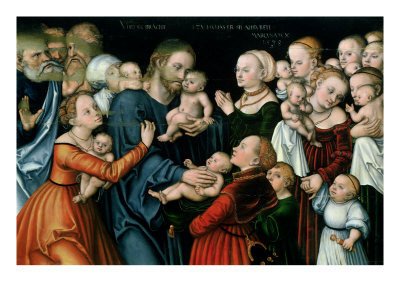 “Let the little children come to me; do not hinder them, for to such belongs the kingdom of God” (Jesus in Mark 10:14).
“Let the little children come to me; do not hinder them, for to such belongs the kingdom of God” (Jesus in Mark 10:14).
We are used to our leaders fawning over children. It’s become cliche that politicians kiss babies and concerned citizens always tell us to “Think of the children!” But such tender concern for children has not always been common.
For Greeks and Romans in the first century there was virtually no sentimentality regarding children. Abortion was frequent. Infanticide was even more common. There were too many mouths to feed in the Empire. Offspring were good to work in the fields, but as small children they were unwanted. They were sometimes left for dead in the outdoors or on literal trash heaps.
The Jews treated their children better. A child was a gift from God. But still, children enjoyed no social standing. Like most women, children derived their standing from their relationship to adult males. As unique persons, little kids were better off seen and not heard.
The disciples, therefore, had good reason to think this business of bringing children to Jesus inappropriate and bothersome. Like waiting in line to ask Jesus to tie your shoe. Like clamoring for Jesus to pet your hamster. The man’s busy and should not be bothered with such trifles.
The disciples were simply managing their Master’s time. Except they had no idea what mattered to the Master. Only once is this word “indignant” used of Jesus. That’s how he felt when the Twelve shooed the children away.
Little children were not the sort of people Jesus meant to avoid. They were precisely the people he wanted to see. Jesus did not find children a bother. He cared about their little cares. Their big cares too. He was more patient with other people’s children than we are with our own. He saw them as examples more than burdens. He was tender with children and tough on those who overlooked them. Jesus loved to welcome the little children, take them in his arms, and bless them. He still does.
December 19, 2012
Some Thoughts on the State of Christian Publishing
 Having spent several weeks trying to catch up on recent releases and thinking about the best books of the year, I thought I’d jot down a few reflections on the state of Christian publishing in general.
Having spent several weeks trying to catch up on recent releases and thinking about the best books of the year, I thought I’d jot down a few reflections on the state of Christian publishing in general.
I’m not writing about sales trends or the rise of digital books. That’s not what I mean by the “state of Christian publishing.” I mean, what is Christian publishing doing well right now and where can it improve? No doubt, there are still scores of terrible books published by evangelical houses each year-horrible in style and worse in content. Thankfully, I don’t come across many of these books. But I do come across a lot of Christian books each year. Not only do I read many of them, as a blogger I get lots of free books from publishers. I also work with publishers from the inside as an author. So I do see a fair amount of what gets released in a given year.
With this limited, but not insignificant knowledge base, here are a few observations.
1. We have an embarrassment of theological riches in the English language. It’s simply astounding the books we can get by a click of the button on Amazon or WTS Books or CBD. And in recent years, we’ve witnessed an avalanche of “big books.” From Bavinck to Beale to Beeke there are brilliant books coming out every year-systematic theologies, biblical theologies, historical theologies. There is more good theology in some of these individual books than in many pastoral libraries. We should be thankful and get at least of few these big books.
2. I’ve been pleased to see fine dissertations having an opportunity to see the light of day. I included two in my list yesterday (Lister and Chapman). I’ve noticed several publishers (like Cascade, Reformation Heritage Books, and Crossway) are willing to give select dissertations a chance, even though the potential for profit is pretty small. I imagine most dissertations can’t be converted well for a broader audience, but as a pastor who doesn’t visit research libraries very often, I’m thankful for the readable research that can be made available in inexpensive paperbacks.
3. Cover designs are so much better than they used to be. But it can be hard to break out of familiar trends.
4. Too many books are derivative in nature. They quote the same books, cover the same ground, and say the same stuff. This is probably a problem in all of publishing. All I can speak to is the Christian world. Although we have more good books than ever before, I still see a lot of books (again, maybe my own?) that strike me as a poor man’s version of something Packer or Piper already said.
5. I’ve seen many books in the past few years that I would put in the category “Really good stuff, but I’m not sure it was book worthy.” These are books that might have been excellent sermons or terrific blog posts or could have been a wonderful long article, but a stand alone book they feel underwhelming.
6. Some topics continue to get a lot of attention (e.g., gospel, marriage, prayer, pastoral ministry, cultural engagement). But there is more important ground to cover. Personally, I’d like to see a deeply theological book about the nature of church unity. I’d like to see more careful “first principles” kind of thinking on politics and the relationship between church and state. I’d like to see someone publish (at a popular level) that go-to book on the doctrine of Scripture. I think we need a myriad of resources on homosexuality-medical, pastoral, legal, cultural, and apologetic.
But on the whole, I want this post to end on a positive note. We all owe Christian publishers a tremendous debt. Their is a business element do their work, but most in the industry consider publishing a ministry first and foremost. Take time to thank God for good publishing houses. Pray for their faithfulness and fidelity. Do what you can to support and encourage them. Think of how different we would be, how weaker our churches would be, how much less our discipleship and Bible study would be, without the Christian books we take for granted. After the Bible, the Spirit, and the body of Christ, has anything been more important in the history of the church than the printed page? Praise God we have more good pages around than ever before.
December 18, 2012
Top Ten Books of 2012
This was a very good year for books. I’ve made several Top Ten lists, and some years I can’t think of ten really strong books to include. This year, however, I had a hard time figuring out which books to bump off.
It should go without saying that this list is not meant to assess the whole gamut of Christian publishing, let alone every interesting book published in 2012. I read a lot of books, but there are plenty of worthy titles that I never touch (and never heard of). This is simply a list of the books (Christian and non-Christian, but all non-fiction) that I thought were the best ones published in the past year.
When I say “best” I have several questions in mind:
• Was this book well written and enjoyable to read?
• Did I find it personally challenging, illuminating, edifying, or entertaining?
• Is it a book I am likely to reread or consult often?
• Do I see myself frequently recommending this book to others?
The books that score well in all categories are “best” and make their way on Top Ten lists.

 10 (tie). Paul David Tripp, Dangerous Calling: Confronting the Unique Challenges of Pastoral Ministry (Crossway).
10 (tie). Paul David Tripp, Dangerous Calling: Confronting the Unique Challenges of Pastoral Ministry (Crossway).
10 (tie). Zack Eswine, Sensing Jesus: Life and Ministry as a Human Being (Crossway)
Both books are convicting, challenging, and freeing. Both are very personal too. Tripp’s book is full of cautionary tales and arresting illustrations. I can’t imagine a pastor not being helped by this volume (though, my one quibble is that I think Tripp is too hard on seminaries). I also agree with Tony Reinke that the design and physical feel of this book are terrific.
I got Eswine’s very recently so I wasn’t able to finish it. But I love what I’ve read, and the endorsements are unusually laudatory. Of the two, Tripp’s is more hortatory and Eswine’s more contemplative. A lot of wisdom, experience, and honesty in both volumes.
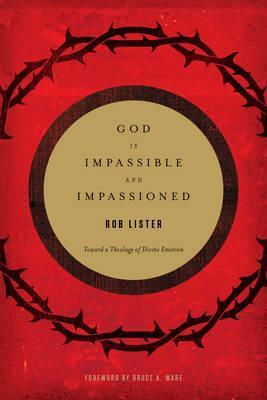 9. Rob Lister, God is Impassible and Impassioned: Toward a Theology of Divine Emotion (Crossway). Ah yes, the book I always thought I might write, but am glad someone else did first. No doubt, Lister’s scholarship is better than mine would have been. We really are in his debt for doing the heavy lifting through the Church Fathers, the Reformers, Moltmann, and the relevant academic literature on the massively important question “Does God suffer?” Lister says no: God is impassible, but that does not mean he is passionless. I hope Lister will consider a popular level volume on the same topic so that more of the church can benefit from his research and reasoning.
9. Rob Lister, God is Impassible and Impassioned: Toward a Theology of Divine Emotion (Crossway). Ah yes, the book I always thought I might write, but am glad someone else did first. No doubt, Lister’s scholarship is better than mine would have been. We really are in his debt for doing the heavy lifting through the Church Fathers, the Reformers, Moltmann, and the relevant academic literature on the massively important question “Does God suffer?” Lister says no: God is impassible, but that does not mean he is passionless. I hope Lister will consider a popular level volume on the same topic so that more of the church can benefit from his research and reasoning.
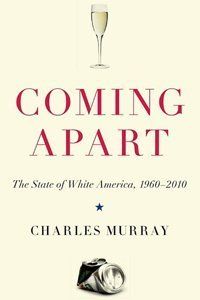 8. Charles Murray, Coming Apart: The State of White America, 1960-2010 (Crown Forum). A much talked about book that will continued to be referenced in the broader culture, especially among conservatives. This book “is about an evolution in American society that has taken place since November 21, 1963, leading to the formation of classes that are different in kind and in their degree of separation from anything that the nation has ever known. I will argue that the divergence into these separate classes, if it continues, will end what has made America America” (11). Whether you agree every jot of his analysis and every tittle of his prescription, you will be challenged to think more deeply about virtue, vice, segregation, culture, the elite, the working class, happiness, and the uniqueness of the American project.
8. Charles Murray, Coming Apart: The State of White America, 1960-2010 (Crown Forum). A much talked about book that will continued to be referenced in the broader culture, especially among conservatives. This book “is about an evolution in American society that has taken place since November 21, 1963, leading to the formation of classes that are different in kind and in their degree of separation from anything that the nation has ever known. I will argue that the divergence into these separate classes, if it continues, will end what has made America America” (11). Whether you agree every jot of his analysis and every tittle of his prescription, you will be challenged to think more deeply about virtue, vice, segregation, culture, the elite, the working class, happiness, and the uniqueness of the American project.
 7. Jay Nordlinger, Peace, They Say: A History of the Nobel Peace Prize, the Most Famous and Controversial Prize in the World (Encounter). This book reads like a survey of 20th century history and a series of mini-biographies. Nordlinger writes with a good pace and a light touch. He has a good sense for keeping things interesting and a keen eye for the inspiring and the ironic. He had my attention after his opening chapters on Alfred Nobel and “Norway the Peaceful.”
7. Jay Nordlinger, Peace, They Say: A History of the Nobel Peace Prize, the Most Famous and Controversial Prize in the World (Encounter). This book reads like a survey of 20th century history and a series of mini-biographies. Nordlinger writes with a good pace and a light touch. He has a good sense for keeping things interesting and a keen eye for the inspiring and the ironic. He had my attention after his opening chapters on Alfred Nobel and “Norway the Peaceful.”
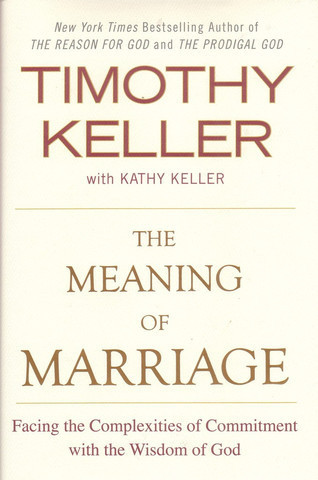 6. Timothy Keller (with Kathy Keller), The Meaning of Marriage: Facing the Complexities of Commitment with the Wisdom of God (Dutton). This is Keller being Keller (both of them!). Their writing is culturally informed, sensitive to skeptics, and full of biblical wisdom. We’ve been reading this book in our small group for the several months. The conversation has been great and everyone has loved the book. There’s a lot in this book for singles too. With a plethora of sound marriage books to choose from, I’m sure I will be recommending this one often.
6. Timothy Keller (with Kathy Keller), The Meaning of Marriage: Facing the Complexities of Commitment with the Wisdom of God (Dutton). This is Keller being Keller (both of them!). Their writing is culturally informed, sensitive to skeptics, and full of biblical wisdom. We’ve been reading this book in our small group for the several months. The conversation has been great and everyone has loved the book. There’s a lot in this book for singles too. With a plethora of sound marriage books to choose from, I’m sure I will be recommending this one often.
 5. Alistair Chapman, Godly Ambition: John Stott and the Evangelical Movement (Oxford University Press). Although the book, being a handsome OUP print, is a bit pricey, it’s worth your investment. If only all dissertations-turned-into-books were as fascinating as this one. Chapman understands Stott both as a seminal figure in the growth of global evangelicalism and as a man born into privilege in a certain kind of Britain that no longer exists. Of particular importance is the insight Chapman gives into Stott’s shift on social issues.
5. Alistair Chapman, Godly Ambition: John Stott and the Evangelical Movement (Oxford University Press). Although the book, being a handsome OUP print, is a bit pricey, it’s worth your investment. If only all dissertations-turned-into-books were as fascinating as this one. Chapman understands Stott both as a seminal figure in the growth of global evangelicalism and as a man born into privilege in a certain kind of Britain that no longer exists. Of particular importance is the insight Chapman gives into Stott’s shift on social issues.
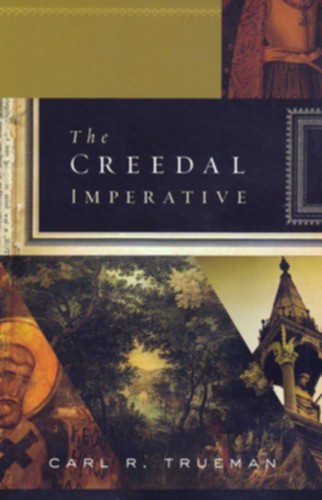 4. Carl Trueman, Creedal Imperative (Crossway). Not long ago one of my friends asked what’s one book I wish everyone in my church would read. Many suggestions came to mind. In the future, this will be one of them. With this book, confessional churches will better understand what they are and why they exist. Non-confessional churches may developing a hankering for catechisms and confessions. Trueman argues cogently and persuasively for the importance of doctrine, definition, and delineation in the life of the church.
4. Carl Trueman, Creedal Imperative (Crossway). Not long ago one of my friends asked what’s one book I wish everyone in my church would read. Many suggestions came to mind. In the future, this will be one of them. With this book, confessional churches will better understand what they are and why they exist. Non-confessional churches may developing a hankering for catechisms and confessions. Trueman argues cogently and persuasively for the importance of doctrine, definition, and delineation in the life of the church.
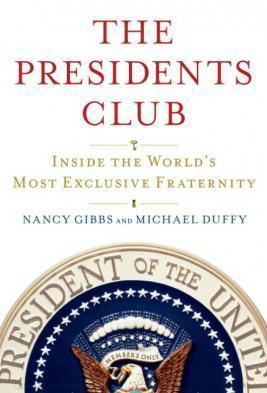 3. Nancy Gibbs and Michael Duffy, The President’s Club: Inside the World’s Most Exclusive Fraternity (Simon and Schuster). Having read their book on Billy Graham and the presidents, I was eager to read another Gibbs/Duffy book on the highest office in the land. They avoid covering the same ground as many other presidential books by looking at the post-WWII presidents as they have related to each other. This unique angle makes for unique history. You’ll find out who was better than you thought (Hoover), which president went rogue (Carter), and which two are surprisingly good friends (Bush 41 and Clinton). This is popular history at its best—accessible, interesting, and with a knack for the untold story.
3. Nancy Gibbs and Michael Duffy, The President’s Club: Inside the World’s Most Exclusive Fraternity (Simon and Schuster). Having read their book on Billy Graham and the presidents, I was eager to read another Gibbs/Duffy book on the highest office in the land. They avoid covering the same ground as many other presidential books by looking at the post-WWII presidents as they have related to each other. This unique angle makes for unique history. You’ll find out who was better than you thought (Hoover), which president went rogue (Carter), and which two are surprisingly good friends (Bush 41 and Clinton). This is popular history at its best—accessible, interesting, and with a knack for the untold story.
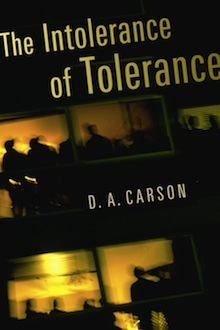 2. D.A. Carson, The Intolerance of Tolerance (Eerdmans). I’m surprised I haven’t heard more people in my circles talking about this book. They should be. Carson tackles the subject of tolerance with his usual verve, careful analysis, theological probing, and well-timed expressions of exasperation. Our staff is just finishing a semester together in this volume. Christian leaders and teachers need to read this book.
2. D.A. Carson, The Intolerance of Tolerance (Eerdmans). I’m surprised I haven’t heard more people in my circles talking about this book. They should be. Carson tackles the subject of tolerance with his usual verve, careful analysis, theological probing, and well-timed expressions of exasperation. Our staff is just finishing a semester together in this volume. Christian leaders and teachers need to read this book.
 1. Joel R. Beeke and Mark Jones, A Puritan Theology: Doctrine for Life (Reformation Heritage Books). This is a remarkable achievement: a systematic theology which synthesizes the best of Puritan thought. Here you’ll find the best of head and heart, of praise and praxis, of careful thinking toward the goal of a godly life. Beeke and Jones are to be commended for a groundbreaking volume that will benefit the church for generations. I know I will mine its riches often. A truly great book in a year of great books.
1. Joel R. Beeke and Mark Jones, A Puritan Theology: Doctrine for Life (Reformation Heritage Books). This is a remarkable achievement: a systematic theology which synthesizes the best of Puritan thought. Here you’ll find the best of head and heart, of praise and praxis, of careful thinking toward the goal of a godly life. Beeke and Jones are to be commended for a groundbreaking volume that will benefit the church for generations. I know I will mine its riches often. A truly great book in a year of great books.
Honorable Mentions
Steve DeWitt, Eyes Wide Open: Enjoying God in Everything (Credo House)
Albert Mohler, The Conviction to Lead: 25 Principles for Leadership that Matters (Bethany House)
Michael J. McClymond and Gerald M. McDermott, The Theology of Jonathan Edwards (Oxford University Press)
George Whitefield (Lee Gatiss, editor), The Sermons of George Whitefield (Crossway)
Greek-English New Testament: Nestle-Aland 28th Edition and English Standard Version (Crossway)
December 17, 2012
Gather Round Ye Children Come
If I could only listen to two Christmas CD’s each year (and thankfully no one has made such a scrooge-ish imposition) I would pick Handel’s Messiah (not just about Christmas I realize) and Andrew Peterson’s Behold the Lamb of God (also not just about Christmas).
Here’s the opening song “Gather Round Ye Children Come.”
And here’s the raspy Derek Webb singing “Deliver Us.”
December 16, 2012
A Prayer for Sandy Hook and for Us All
Our gracious Father,
As we look forward to this season with all its songs, and Scriptures, and traditions–
As most of us look forward to time with our families over the next three weeks–
As many of us look forward to the children’s Christmas program tonight–
Our hearts are broken to think of the tragedy in Newtown, Connecticut. We think of the words of Job: “Oh that my vexation were weighed, and all my calamity laid in the balances! For then it would be heavier than the sand of the sea” (Job 6:2-3a).
And the words of Jeremiah: “My eyes are spent with weeping; my stomach churns; my bile is poured out to the ground because of the destruction of the daughter of my people, because infants and babies faint in the streets of the city” (Lam. 3:11).
And the words quoted by Matthew when he recounted another Massacre of the Innocents: “A voice was heard in Ramah, weeping and loud lamentation, Rachel weeping for her children; she refused to be comforted, because they are no more” (Matt. 2:18).
In the face of such grief and evil we do not know what to do or how to help. But we can pray.
We pray in confidence that you are with us and in faith that you hear us. As it says in Exodus: “The people of Israel groaned because of their slavery and cried out for help. Their cry for rescue from slavery came up to God. And God heard their groaning and remembered his covenant with Abraham, with Isaac, and with Jacob. God saw the people of Israel-and God knew” (Exod. 2:23-25).
We pray for the family, friends, neighbors, and co-workers of the Sandy Hook victims: Dawn Hochsprung, Mary Sherlach, Victoria Soto, Anne Marie Murphy, Lauren Rousseau, Nancy Lanza, and Rachel Davino. And the children: Charlotte Bacon, Daniel Barden, Olivia Engel, Josephine Gay, Ana M. Marquez-Greene, Dylan Hockley, Madeleine F. Hsu, Catherine V. Hubbard, Chase Kowalski, Jesse Lewis, James Mattioli, Grace McDonnell, Emilie Parker, Jack Pinto, Noah Pozner, Caroline Previdi, Jessica Rekos, Avielle Richman, Benjamin Wheeler, and Allison N. Wyatt.
Give comfort to their families. Bring healing and hope to the school and the community. Bear their griefs, Lord Jesus, and carry their sorrows. Show yourself, dear God, as the Father of mercies and the God of all comfort (2 Cor. 1:3).
Bless the teachers who will return to work next week, in Newtown and all across this country.
Bless the students who may be filled with confusion, anger, and fear.
Bless the pastors who must counsel, comfort, and preach to their people the words of life.
Bless your people with hearts of compassion and acts of service, that they might show your love to all who are hurting.
Make us winsome in our witness for Christ, especially those who will be called upon in the days ahead to give a reason for the hope that they have (1 Peter 3:15).
With so many in our nation thinking now of weighty things, give us ears to hear what is true and what leads to eternal life. May this evil be a reminder of our own depravity. May these deaths remind us of our own mortality. And may the loss of life remind us of Him who conquered the grave.
Let us look upon Jesus, our Suffering Servant and sympathetic High Priest.
Turn the hearts of the sorrowful to the Man of all Sorrows (Isa. 53:3). Turn the eyes of the weeping to the Savior who wept for his friend (John 11:35). Turn the cries of all those asking “Why?” to the cry of him who said on the cross, “My God, my God, why have you forsaken me?” (Mark 15:34).
We praise you Father that you sent your Son to share in our flesh and blood, that through death he might destroy the one who has the power of death, that is the devil, and deliver all those who through fear of death were subject to lifelong slavery (Heb. 2:14). Because of you, Christ Jesus, we do not mourn as those who have no hope (1 Thess. 4:13).
We believe you are the resurrection and the life (John 11:25).
We believe you mean for good what a 20-year old murderer meant for evil (Gen. 50:20).
We believe you will one day judge the living and the dead (John 5:27-29).
We believe you will wipe away every tear from our eyes (Rev. 21:4).
Even now in this season as we celebrate your first Advent, we so eagerly await your second. Come thou long-expected Jesus, come quickly. Amen.
December 15, 2012
The Silence of God
The silence of God is often taken as a sign of his absence in the midst of suffering. But what if God stays silent, for a time, that he might listen?
During those many days the king of Egypt died, and the people of Israel groaned because of their slavery and cried out for help. Their cry for rescue from slavery came up to God. And God heard their grumbling, and God remembered his covenant with Abraham, with Isaac, and with Jacob. God saw the people of Israel–and God knew (Exodus 2:23-25).
December 14, 2012
Our Only Comfort
What is your only comfort in life and in death?
That I am not my own,
but belong–
body and soul,
in life and in death–
to my faithful Savior Jesus Christ.
He has fully paid for all my sins with his precious blood,
and has set me free from the tyranny of the devil.
He also watches over me in such a way
that not a hair can fall from my head
without the will of my Father in heaven:
in fact, all things must work together for my salvation.
Because I belong to him,
Christ, by his Holy Spirit,
assures me of eternal life
and makes me wholeheartedly willing and ready
from now on to live for him.
(The Heidelberg Catechism, Question and Answer 1)



